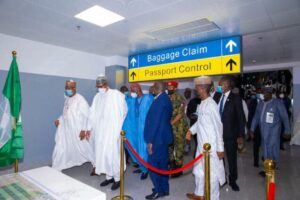
Stakeholders have called for the expansion of airport infrastructure to accommodate the growth taking place in the air transport sub-sector, especially after it has fully recovered from the COVID-19 pandemic.
The Chairman, West-Link Airlines, Captain Ibrahim Mshelia joined other stakeholders and called on the Federal Airports Authority of Nigeria (FAAN) and the federal government to urgently expand airport facilities so that they would reflect the increase of passenger traffic, increase in number of airlines utilizing the facilities and also accommodate the number of aircraft that operate at the ramp.
Captain Mshelia said that in areas where expansion space is limited, FAAN should be creative and review the utilisation of available facilities, emphasizing that infrastructure deficit at the airports contribute to flight delays.
Recently the Chairman and CEO of Air Peace, Allen Onyema reiterated the need to expand airport facilities as the industry is growing, especially as more airlines have joined the domestic market and there is discernible increase in passenger traffic.
Speaking in the same vein. Captain Mshelia explained, “Check-in counters are part of suitable accommodation to process passengers. So a terminal building should be spacious enough to take the number of intending partners. Every operator writes to the concerned authorities and tells them what in tends to do. The airport authority is supposed to acknowledge such letters. Over the years what we’ve done is that we just keep talking to the airlines and we don’t do the infrastructure expansion.
“For example, Arik Air, Air Peace, Ibom Air, Aero Contractors and Dana Air; these five airlines alone can cover the whole terminal by the time they schedule 7 O’clock departures from one terminal and all of them came schedule 7 O’ clock departures, no doubt, but how many of them do take in the passengers to depart at that time? Averagely, let’s say the passengers on these aeroplanes will be between 120-170 depending on the aircraft size. If you are going to do 120 passengers by five airlines, they need to check them in (I’m just giving you a typical example) that would be 600 passengers, now that will take you quite some time to check in because of the space and infrastructural deficit, it takes up to five minutes to check in one passenger, it does. So, even if you say two minutes to check in a passenger, how many counters would you need to be able to check in those people within the two-hour rate that they give as standard time?
“They give you two hours to check in passengers so you will need 300 check in counters if you’re going to use two minutes by passengers. If there is no space for that; then you have congestion and then you have chaos and then you have commotion at the end. So passenger delay, sorting their baggage, access to the tarmac, moving the bags, number of vehicles that can do it and so on. There are so many things that are combined in the infrastructure that we are talking about, there is infrastructure but the capacity of airlines have overwhelmed it and one wonders why all these years nothing was done to expand it until only recently that they are doing some expansion.”
Mshelia spoke about the Common Use Passenger Processing System (CUPPS), which airlines use to check in passengers and their luggage, saying that despite the utilisation of such facility, the counters still needs to be expanded because passengers would still come with their luggage and that commotion would still be there “or you introduce a slot system but by the time you introduce a slot system. You are limiting the capacity of the airline and you should not do that. Slot system for domestic airlines shouldn’t be the case; you should have more terminals being built.”
On the way forward, Mshelia said the quick fix solution is to seek for the underutilized or wholly unused spaces that still exist, especially at the Nnamdi Azikiwe International Airport, Abuja and put such spaces into full use.
“I know there are spaces in Abuja that are not being used. Open them up to the domestic airlines; like the old international airport terminal in Abuja. It is not being used properly, so why don’t you open all of it; that would solve the problems. In Lagos, another thing you can also do is use the space between the domestic and international terminals. If Abuja bound traffic is checking in, Warri bound traffic is checking and with the other airlines checking in also to Abuja from the same Lagos; the quick fix is open up all the airport to operate till midnight. If you do so, the airlines, on their own, will naturally adjust their schedules and give space. Such action would naturally mitigate the space problem without doing anything to the current infrastructure. If you open the airport to close at midnight, you have solved a lot of the problems already and in Abuja open up the old international terminal that is not being used,” he said.

The Chairman of West-Link Airlines stated that if existing facilities are working efficiently and those manning them are competent and dedicated, operations would have been more result oriented than what is currently obtained.
“I do not see a reason why a conveyor belt should break down in the first place, or screening machines should break down in the first place. Which means the people who are manning them are either nonchalant or incompetent. I am a pilot and I’ve visited a lot of countries inside the region and beyond, I’ve never heard of this equipment breaking down. I’ve never heard it anywhere except Nigeria because we do not allow our best hands to run our affairs. Corruption is killing this equipment at the airports; lack of attention due to corruption because every machine being designed has its own servicing procedures and age. This is an airport we are talking about and everything is done for safety and timing. We should endeavour to do things properly and this problem will go away. Conveyor belts will not break down and if it does it is once in a blue moon. It is not acceptable but the rate at which I hear conveyor belt breaking down and looking at the obsolete things we have at the airports. Why can’t we upgrade them when we should upgrade them? So, it is still about our intention to do the right things or not,” he said.






